The
Duelist:
A
chaotic NPC who likes to make people pay
by Arthur Collins
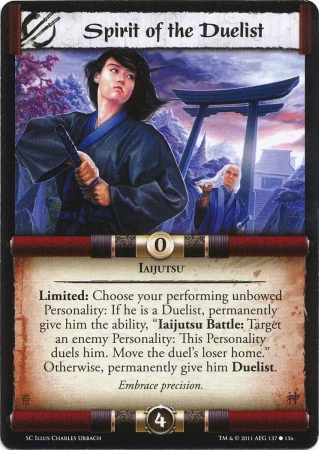
The
Duelist:
A
chaotic NPC who likes to make people pay
by Arthur Collins

|
|
|
|
|
|
|
|
|
Bladesemmer |
|
|
Rain fell steadily outside
on the balcony, running off to fill
the ruts in the road.
The chancellor sat at his desk, his expression
as sullen as the sky,
but lit by no flashes such as occasionally
brightened his office.
The council meeting had not gone
well. The king had scorned
his advice again, and turned to the
ever-more-popular young
Lord Alfstan of Golvring, who kept
up his prattle about
cleansing the government of corruption.
Honest men are dangerous,
thought the chancellor. But what to
do? Thunder growled in
answer to his mood.
After a time, a change
came over the chancellor?s face. Honest
men are dangerous to
others, he thought, but honorable men ?
young, valiant, noble,
honorable men ? they can be made a
danger to themselves.
Quickly, he fetched writing materials and
wrote a brief note, without
signature or seal. He called for a
trusted lackey, gave
him the missive, and said only, ?Leave this
with the innkeeper at
the Laughing Trout.? The lackey glanced
at the address, which
said only Holgim. The chancellor grinned
as the messenger headed
for the rain-soaked street below. . . .
?It?s going on right
under my nose, Gunnar!? The fat man
almost choked on his
outcry. His fellow merchant only sipped
his beer and said, ?Calm
down, Wulfram. People will notice.?
But that hardly seemed
likely in the roaring inn. Bawdy songs
competed with three-score
drunken men discussing everything
but the cursed weather.
Smoke from the fireplace and steam rising
off drenched cloaks hung
around the common room, shrouding
it in a thick haze.
Wulfram continued talking
to Gunnar, in an angrier but
quieter voice. ?I?ve
told her, I don?t want that young leech
around. But every time
I look, there he is lounging in my chairs,
eating my food, and making
verses to my wife. And that?s not all
he?s making ? I found
one of his lute strings in my wife?s
chambers. She said she
only took it there to compare it with her
spare strings; she said
he needed a new one. But I?m not so old
and slow that I?m blind.?
Wulfram ended on a note of self-pity,
such as often heard from
rich, middle-aged men who marry
young wives. His friend
Gunnar made sympathetic noises, and
then began to give him
low-voiced counsel, pausing often to
look around as if he
feared being overheard, finally pointing out
a figure in a corner
booth.
In the corner of the Laughing
Trout's common room sat a
very wet man. He looked
neither old nor young, rich nor poor.
His dress did not particularly
advertise his profession. Only the
scabbard lying across
his knees and his good gloves might give
one to guess that he
made his living at arms. At the moment, he
was reading a hastily
scrawled note given him a few moments
ago by an equally drenched
man.
Sipping his wine reflectively,
the man named Holgrim mused
on the ways of fortune.
Not a job in sixteen days, he thought,
and now this. . . . Not
a bad fee, but how do I find the man
named in this document?
At that moment a group
of young nobles came cascading
through the door, led
by the king?s new reeve, Lord Alfstan.
Well, well, thought the
man. Here comes the rent.
Then Holgrim glanced
to the side and saw a rather fat, greasy
man approaching him.
Wulfram the wool merchant ? coming
to me? Holgrim thought.
It never rains but it pours, they say. He
chuckled to himself,
just as old Wulfram cleared his voice and
said nervously, "Master
Holgrim?"
Holgrim invited the merchant
to sit, and heard his tale. They
agreed on a price, and
then Holgrim rose, saying, ?It may take
me a few days to attend
to your business, Master Wulfram, but
I?ll see to it as soon
as may be. Shortly, I may have to leave town
for a while.? Leaving
the merchant to pay his bill, Holgrim
stood up, loosened his
sword in its scabbard, walked up to the
dashing young royal favorite,
and announced to the crowd at
large certain speculations
about family life at Golvring Castle.
The crowd gasped, the
innkeeper began to put his breakables
below the bar, and Holgrim
the Duelist set himself to practice
his trade.
* * *
For as long as personal combat
has been going on, there have
been specialists who would
sell their prowess at it. Some have
sold their services as mercenaries;
this article has nothing to do
with them. Mercenaries tend
to be group-minded and barely
proficient at arms; their
place is to fill out a troop of soldiers.
The emphasis in soldiering
is on maneuver and cooperative
effort. It is very fitting
that most mercenaries in the AD&D
game are permanently 0-level
fighters. Repeated and frequent
success in one-on-one combat
requires something that a mere
soldier is not up to providing.
The specialists in personal combat
became not mercenaries,
but duelists.
And so evolved a distinct
kind of profession. In Roman times,
there were the gladiators,
who made their way up from ignominy
to international honor through
their individual skill alone; in
Renaissance times, there
were the fencing instructors, who
taught young rakes how to
duel (and live to brag about it) the
way that other specialists
taught them how to dance or take
snuff; and in all times,
there have been the hired swords (?hired
guns? in the Ole West),
who have wandered about, fighting for
glory, or money, or for
lack of a better calling in life. The duelist
non-player character class
for the AD&D system represents this
type of expert -- one who
makes his living by selling his skill in
individual combat.
Typically, the duelist is
of common birth. Serfs are given no
opportunity to learn to
bear arms, and nobles who take up arms
as a profession tend to
become fighters or paladins. Sometimes,
as with the Roman gladiators,
duelists are of the lower class,
though they might have wound
up that way not by accident of
birth but by running afoul
of the law. Sometimes they are of the
lesser nobility ? younger
sons of younger sons, with no inheritance
to give them status and
no mind to be soldiers. Sometimes
they are merely disaffected
types, loners or even outcasts, whose
only claim to fame is their
reputation with their blade.
This way of describing a
duelist goes far to explain the alignment
preferences of the class.
The duelist has little use for law as
an ethical principle, whether
the law involved is good, bad, or
neutral. Besides the fact
that their profession is often illegal
(though they are sometimes
used by the protectors of the law),
duelists also shy away from
lawfulness because of their general
outlook on life: They see
things in individual terms (me against
you), not in group terms
(us against them). To be sure, most
duelists are scrupulous
about fulfilling contracts, but this is not
a lawful-minded tendency
so much as a matter of professional
(by definition, individual)
honor. Besides, an unreliable duelist
gets no contracts.
Duelists, you see, have something
of a code to live by, a parody
of the knightly code of
arms. The knightly code is born of law:
Arms are to be used to execute
justice; fair play (not taking
undue advantage of an opponent)
should influence behavior; the
warrior is part of an arms-bearing
brotherhood pledged to defend
the community.
By contrast, the duelist
lives by a highly individualistic (i.e.,
chaotic) code. Professional
skill is exalted rather than the obligation
to do justice: if the duelist's
conscience sometimes accuses
him of being a mere assassin,
he tells himself he is just doing his
job (and doing it well,
by thunder!). Professional pride is a more
important consideration
than ?fair play? ? a duelist, like a
knight, does not take undue
advantage of an opponent, but a
knight does this to be fair,
while a duelist does it lest his reputation
be besmirched. (This explains
why a duelist will not use
poison or flaming oil in
personal combat ? these are tools good
THE DUELIST
Minimum ability scores:
Strength: 9
Intelligence: 10
Dexterity: 15 (17+ = 10%
bonus to earned experience)
Constitution: 9 (hit-point
bonuses as for fighters)
Q:
What are the minimum wisdom and
charisma scores necessary
for a duelist
character (issue #73)?
A: The duelist, a
FIGHTER subclass for
NPCs, should have a minimum
score of 6
in each of these characteristics.
This
assumes that NPCs must also
abide by the
'5 or lower' rule that PCs
must follow. A score lower
than 6 in
either ability would force
the character to
be a thief (if wisdom was
5 or lower) or
an assassin (if charisma
was 5 or lower).
In the duelist article,
ability-score
requirements were listed
only for those
characteristics that have
a minimum
higher than 6.
(79.14)
Racial stock:
Human || half elf
Hit die type:
d12
Spell ability:
None
Class level limit:
15 (Grand Fencingmaster)
Armor & weapons
permitted:
Armor: Leather
Shield: None
Weapons: Dagger, scimitar
(cutlass, sabre), quarterstaff,
bastard sword, broad sword,
long sword, short sword
Q: Why are duelist
NPCs unable to use
flails? This weapon has
been used in
fencing training.
A: The sage has been
unable to locate
anyone or any source that
mentions the
use of flails in fencing
training; at any
rate, the NPC classes described
in
DRAGON
magazine do not have to correspond
exactly to one particular
concept
of what a class should be
like.
(79.14)
Oil: No
Poison: No
No. of attacks per
round:
Duelist level 1-4: 1/1
Duelist level 5-9: 3/2
Duelist level 10-14: 2/1
Duelist level 15: 5/2
Weapon proficiency:
Initial no. of weapons:
3
Non-proficiency penalty:
-2
Added proficiency/level:
1/3 levels
Alignment:
NG, neutral evil, chaotic good,
chaotic evil, chaotic neutral,
or true neutral
enough for a cheap assassin
or a stupid tavern brawler, but it
would be seen as a failure
in the area of his professional skill and
bravery for a duelist to
do the same.) The duelist is a loner,
which means his worth is
not measured by his attainments as a
member of a warrior class,
but by his individual achievements.
And so the world fears,
admires, shuns, and brags of acquaintance
with the duelist, all at
the same time. He is both hero and
villain. And he does have
his place, not only as a hired sword (or,
in some cultures, as a professional
athlete). Running a fencing
school, as many duelists
do, is a very respectable occupation. It
should be noted that what
a Fencingmaster turns out of a fencing
school are not necessarily
more duelists ? it takes more than
just fighting ability to
fit that mold, it takes a certain kind of
person. The Fencingmaster?s
customers are young men who
desire to be accomplished
at the skills of dueling ? but who may
be incapable of actually
becoming duelists.
In a society or culture in
which a gentleman is expected to be
skillful at arms (even if
the gentleman is obviously unfit for it),
the Fencingmaster?s school
becomes a combination hangout,
gymnasium, betting parlor,
and male gossip-shop all rolled into
one, and the Master himself
is a man of reputation who is not
only dangerous to cross
but who can expel you from much of
society by simply barring
you from his hall. A paradox: The
Fencingmaster has no place
in society (being base-born and having
to work for his living),
but he is in many ways one of the
keepers of the keys to society?s
door, like the innkeeper of the
most fashionable watering
hole. And, like inns, there is no better
place to hear certain kinds
of news than a fencing academy.
Athlete, hired killer, or
patron of youthful nobility, the duelist
plays many roles, but he
is always what he is. Grim or merry,
devious or straightforward,
famous or infamous, he stands on his
own merits.
1 Only duelists with 17+
dexterity can attain
this level or higher.
2 Only duelists with 18 dexterity
can attain
this level or higher.
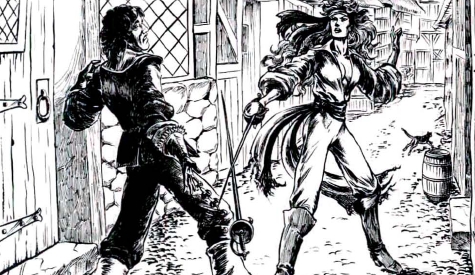
Grand Fencingmasters are
not limited in number, as are
holders of top levels in
the assassin, druid, and monk classes.
Duelists are regularly engaged
to slay people for hire (often by
"calling out" their opponents),
and the fees for assassins? work
are typical of duelist fees,
for which the duelist gains experience.
A duelist may have no henchmen
until he or she attains at
least 7th level.
Of all fighter encounters
in a city or town, 5% (roll of 1 on d20)
will be with a duelist.
Likewise, the duelist gains
experience points from the Assassination
Experience Points Table
for every foe he overcomes in
single, open combat. Opponents
so sought must be armed with a
weapon, as opposed to being
armed solely with natural weaponry
(such as many monsters have).
Giving the duelist 12-sided
hit dice is not intended to convey
the impression that duelists
are monstrous hulks, like sumo
wrestlers. As the DMG
points out (p. 82), hit points "reflect
both
the actual physical ability
. . . to withstand damage . . . and a
commensurate increase in
such areas as skill in combat and similar
life-or-death situations,
the "sixth sense" which warns the
individual." And again,
"the balance of accrued hit points are
those which fall into the
non-physical areas . . . ." In other
words, a character taking
damage in a long fight is not necessarily
getting cut up so much as
he is getting worn out; his concentration
lags, his arms get tired,
his feet begin to drag, until he is
down to his last few hit
points. That's when one simple thrust
might kill him, as it would
any man -- when he is open to the
blow. By definition, a duelist
is an expert at hand-to-hand combat;
his inventory of tricks,
his professional skill, and his stamina
are superior to those of
other fighter-types. By giving the
duelist 12-sided hit dice,
these superior abilities are expressed in
game terms. A 10th-level
duelist will average more hit points
than a 10th-level fighter,
thus giving the former an appropriate
edge in one-on-one combat;
the duelist can outlast and wear out
an opponent who is less
skillful than he.
A duelist is surprised only
on a roll of 1 on d6, and his code of
?honor" makes him dislike
attacking by surprise in a one-on-one
fight. (But he is no fool;
survival is ultimately more important
than ?honor,? and surprising
an opponent is certainly not prohibited.)
However, he only gains experience
points on the Assassination
Table if the fight is entirely
conducted in the open ?
unless his intended victim
surprised him. Note that ?open?
merely means man-to-man,
without surprise being used by the
duelist. It does not imply
a public fight, nor does it entail a challenge
conveyed through seconds.
The DM will have to adjudicate
all situations that require
a ruling on whether or not the duelist
will get experience points
for a one-on-one fight.
When fighting opponents
armed with weapons (other than
missiles), the duelist gains
bonuses to his armor class, simulating
his superior skill in parrying
blows. He also gains bonuses ?to
hit? and damage (referred
to in the table below as the ?combat
bonus?) when fighting an
opponent who is using a hand-held
weapon. This bonus increases
when the duelist is fighting an
opponent using the same
weapon the duelist is using:
| Level of duelist | AC bonus | Combat bonus | Combat bonus vs. same weapon |
| 1-3 | +1 | +1 | +1 |
| 4-6 | +2 | +1 | +2 |
| 7-9 | +3 | +2 | +3 |
| 10-12 | +4 | +2 | +4 |
| 13-15 | +5 | +3 | +5 |
Duelists use the combat tables
and saving-throw tables for the
fighter class, and conform
to the specifications of that class with
regard to psionics and the
use of magic items. In addition, they
are considered as fighters
for any other determinations not specifically
mentioned herein.
When fighting humanoids
of size S or M in hand-to-hand
situations, the duelist
(and his associates) gain a +10% bonus to
morale. The associates get
this morale bonus only if they know
the duelist for what he
is -- that is, a member of the duelist class.
Parrying the death blow:
If the duelist receives a hit from a
weapon which would finally
take him to 0 hit points or lower in
that blow, he gets a saving
throw (vs. death). A successful save
indicates no damage. On
a second such death-blow attempt made
during the same melee (but
not during the same round; see
below), before the duelist
has regained some hit points through
healing or other means,
a successful save indicates half damage
from the blow (or the duelist
is reduced to 1 hit point, if that is
necessary to keep him alive).
A third such saving throw in the
same ongoing melee is not
allowed unless the duelist has first
had some hit points restored.
This special parrying ability applies
only to attacks with hand-held
weapons made by weaponsusers.
Thus, the duelist gets a
save vs. a minotaur?s axe or a hill
giant?s club, but not vs.
a dragon?s bite, a pseudo-dragon?s sting,
or a scythe-blade trap.
This special ability comes
into play when the duelist is down
to few enough hit points
so that his opponent's potential maximum
damage could kill the duelist
with a single blow. The
opponent?s potential maximum
damage, for purposes of this
determination, is the maximum
damage of the opponent?s weapon,
plus any bonuses that apply
to the opponent?s damage figure.
If the opponent scores a
hit, the duelist may attempt to parry
the blow before dice are
rolled to determine the actual damage.
Example: An opponent with
a strength of 18/03 using a +1
long sword could potentially
do 12 points of damage ? 8 with
the sword, +1 for the magic,
and +3 for his damage adjustment
due to strength. The duelist
then has the option to attempt his
parry when he is reduced
to 12 hit points or less vs. this opponent,
after the opponent has rolled
a ?to hit? die successfully,
and before damage is actually
assessed. Should the duelist be
down to 5 hit points or
less, he must attempt to parry automatically,
since the minimum potential
damage his opponent can
inflict with a successful
hit is 5 points ? 1 with the sword, +l for
the magic, +3 for his damage
adjustment.
As long as an opponent's
minimum potential damage is less
than the duelist?s remaining
hit points, the duelist does have a
choice in whether or not
to attempt to parry the death blow.
After all, this is a last-gasp
trick, and he might want to keep it as
an ?ace in the hole? for
one more round. Should the duelist be
fighting more than one opponent,
he may be forced to choose
which of two or more equally
deadly blows he will attempt to
parry; he cannot try this
trick twice in a round. Life is full of
hard choices, isn?t it?
Two-weaponed combat:
Duelists take 1 less point off in penalties
for off-hand weapon swings
in two-weaponed combat, but
they will only fight in
such a fashion against other twoweaponed
humanoids or plain old monsters.
The duelists? code
forbids them to seek a two-weapon
advantage over a oneweaponed
opponent, except in life-or-death
situations.
Resistance to fear:
Duelists make all saving throws vs. fear
attacks at +2.
Identify magical properties:
At 10th level and above, a duelist
has a 5% chance per level
of identifying the magical properties of
weapons usable by his class.
(One attempt per weapon per level.)
The Fencingmaster and his school
At 10th level (Fencingmaster)
and above, the duelist has the
option of establishing a
fencing school. Such an establishment
must be located in a large
town or city, and must have adequate
supplies and sufficient
space for the exercises and activities that
will go on there. Employment
of a swordsmith is mandatory for
such an establishment. The
Fencingmaster will then attract students
to his school.
Hiring a Fencingmaster as
a teacher will cost 200 g.p. a
month, and one can only
be hired for a month at a time. Each
month of work with a Fencingmaster
gains a student a 10%
cumulative chance of gaining
a +1 "to hit" with a particular
weapon the Fencingmaster
employs. Dice are rolled once, at the
end of the training, to
see if the student gets the +1. This training
must be uninterrupted by
adventuring, and there is a maximum
60% chance of gaining the
bonus. If the roll fails, the training
must begin all over again.
A student earning a +1 with a particular
weapon (e.g., a long sword)
cannot earn a further bonus with
that weapon by continuing
to study with a Fencingmaster, no
matter how long he or she
trains -- but the +1 "to hit" could be
gained in this way for more
than one weapon, if the student
engages in additional instruction.
The Fencingmaster can handle
up to 30 students at a time, but
if he goes out adventuring
for more than 3 days in any month,
his students will suffer
from his absence, because their training
will have been interrupted
for too long -- and the Fencingmaster
will accordingly be deprived
of the income those students would
have provided.
The number of students a
Fencingmaster has at a given time
can be determined randomly
by rolling 5d6 to see how many students
a Fencingmaster has, and
adding one student to the result
for every 3 points of charisma
the Fencingmaster has, up to a
maximum enrollment of 30.
Fencingmasters, unlike fighters,
acquire no followers upon
reaching name level (10th),
even if they establish a school.
Duelists? reputations have
a tendency to get around, and they
are known, or known about,
to a greater extent as they become
more accomplished. Most
duelists will be aware of other duelists
of equal or higher level
operating in the vicinity. Sometimes a
duelist will "call out"
another duelist on his own initiative, just
to prove himself. Grand
Fencingmasters are more often revered
than challenged, however,
and this is also the case with many
other duelists of great
reputation and high charisma.
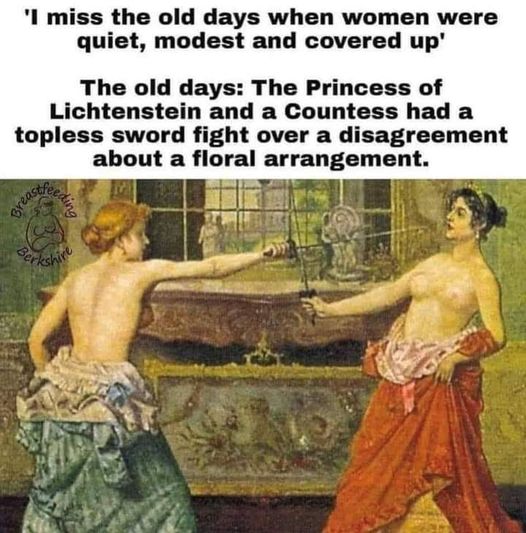
1. SUBCLASS = fighter
2. SOCIAL CLASS MINIMUM = "typically of common birth"
3. ABILITY SCORE MINIMUMS
STRENGTH = 9
INTELLIGENCE = 10
WISDOM =
DEXTERITY =
CONSTITUTION =
CHARISMA =
COMELINESS =
Strength: 9
Intelligence: 10
Dexterity: 15 (17+ = 10%
bonus to earned experience)
Constitution: 9 (hit-point
bonuses as for fighters)
4. POSSIBLE RACES & MAX. LEVEL ATTAINABLE =
5. MULTI-CLASS POSSIBILITIES =
6. HIT DIE TYPE =
7. MAXIMUM NUMBER OF HIT DICE =
8. SPELL ABILITY =
9. ARMOR PERMITTED =
10. SHIELD PERMITTED =
11. WEAPONS PERMITTED =
12. OIL PERMITTED =
13. POISON PERMITTED =
14. ALIGNMENT =
15. STARTING MONEY =
16. WEAPON PROFICIENCIES =
17. NON-PROFICIENCY PENALTY =
18. NON-WEAPON PROFICIENCIES =
19. STARTING AGE =
20. COMBAT =
21. SAVING THROWS =
22. MAGIC ITEMS =
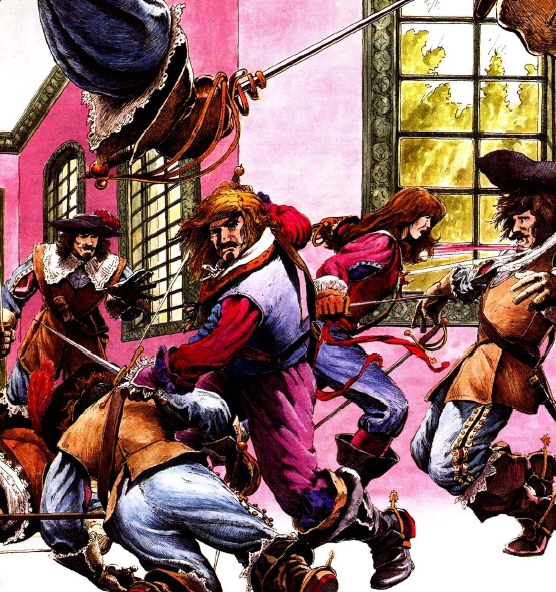
ROGUES' GALLERY: 100 DUELISTS
zb.
26.
25.

24

23
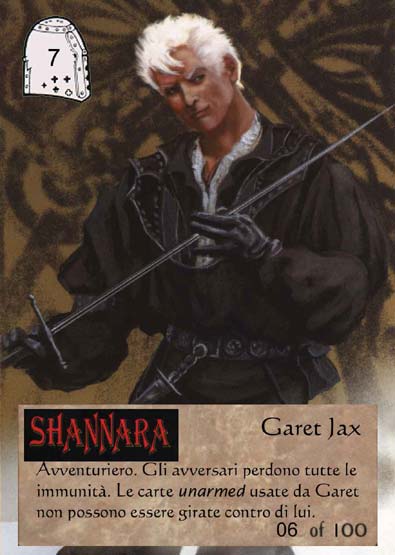
22
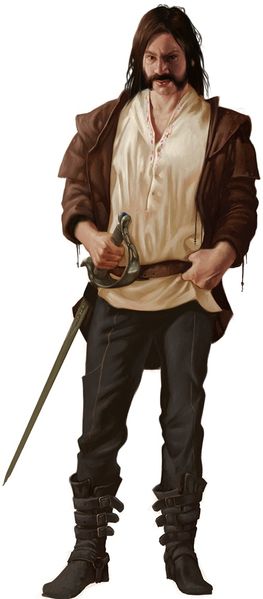
Korm Calladan
21.
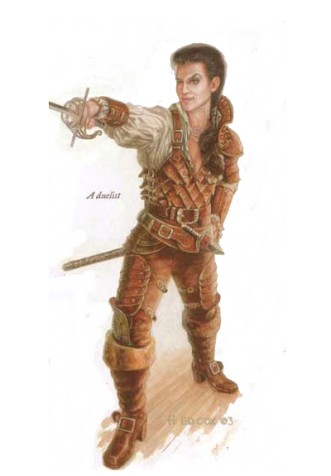
20.

19.
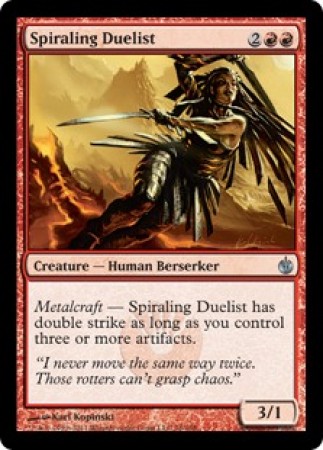
18.
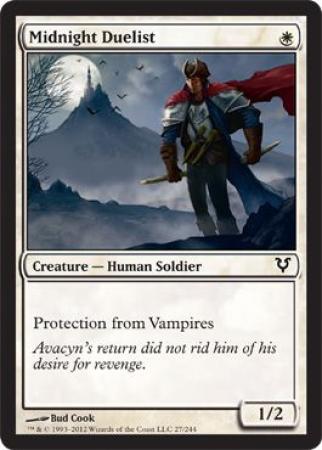
17.
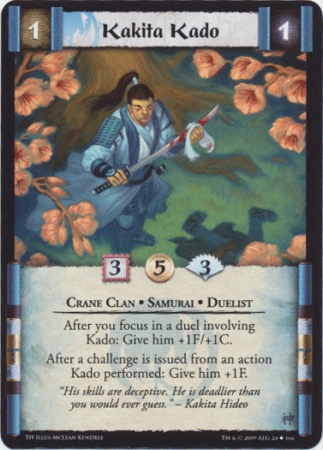
16.
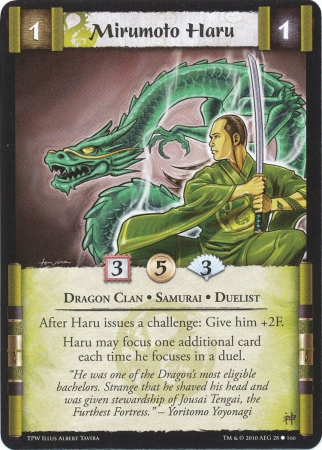
15.
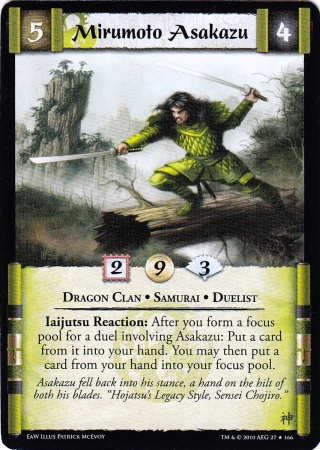
14.
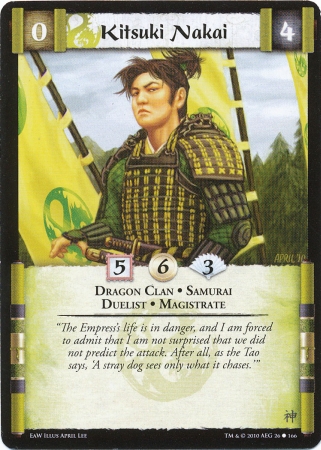
13.
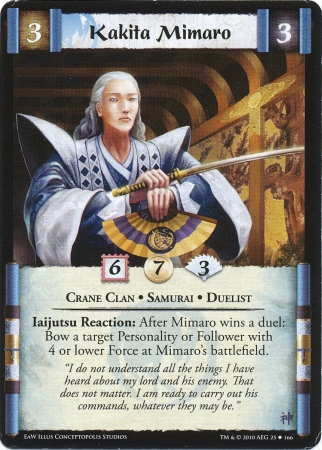
12.
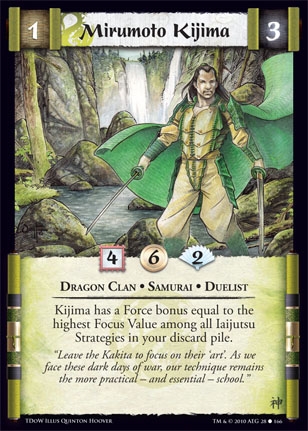
11.
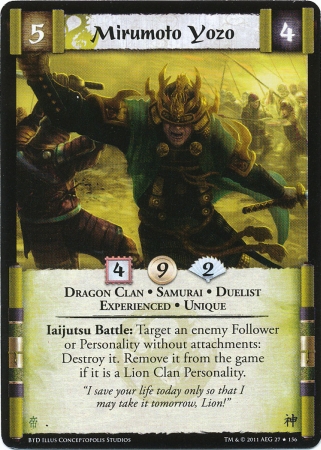
10.
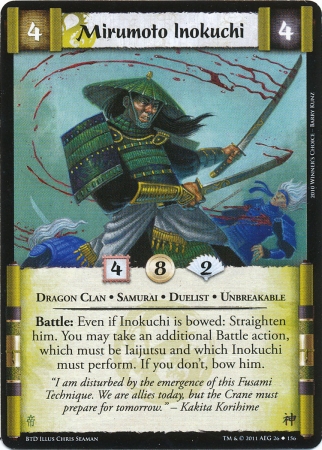
9.
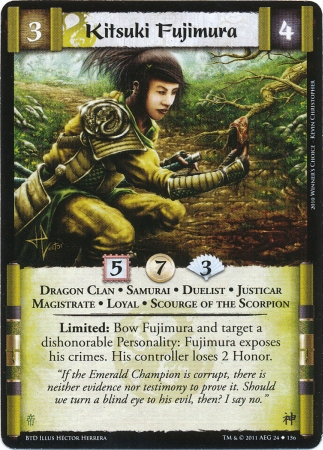
8.
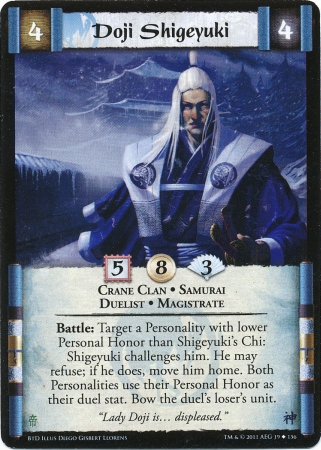
7.
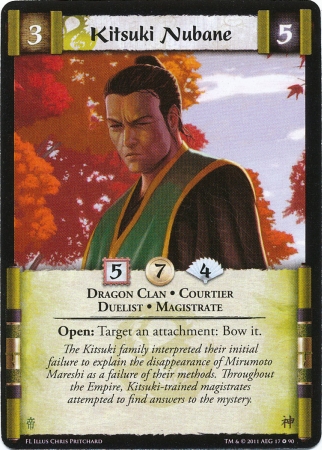
6.
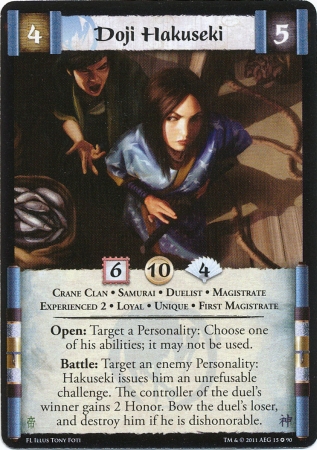
5.
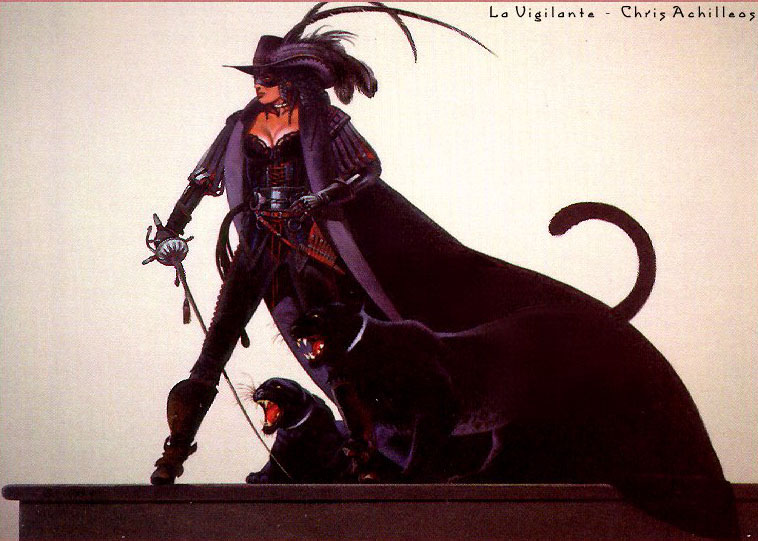
4.
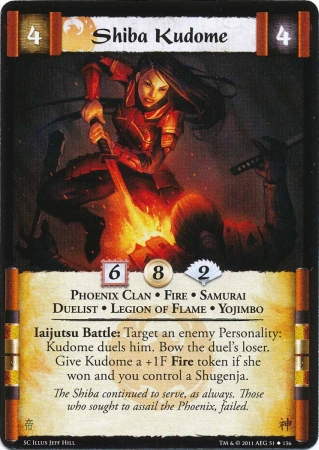
3
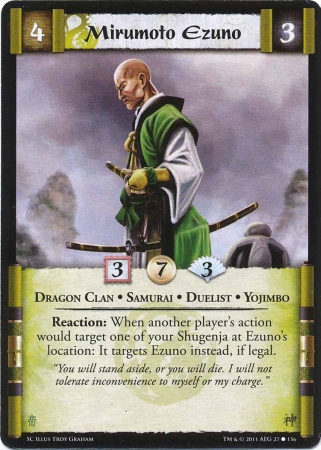
2.
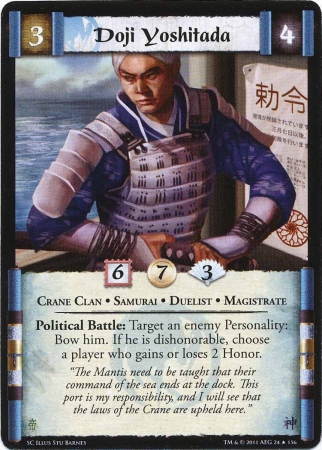
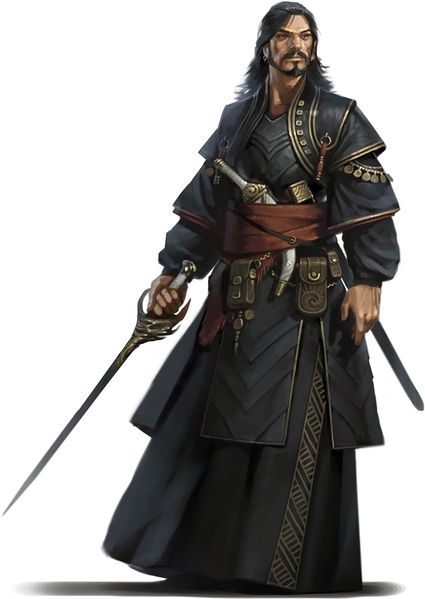
Salim Ghadafar.jpg